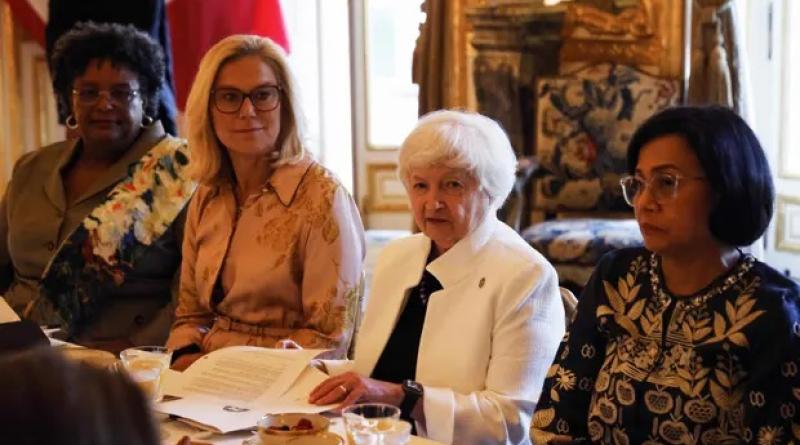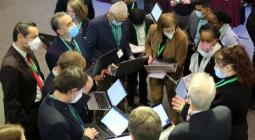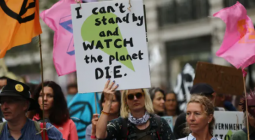Paris climate finance summit fails to deliver debt forgiveness plan

Poorer countries struggling with a growing debt crisis were thrown a lifeline at a global finance summit in Paris but the plans still fell short of the debt forgiveness programme that some had hoped for.
Progress was made on reforms that would help address the climate emergency, as nearly 40 world leaders and the heads of global institutions met in Paris for the summit, which ended on Friday.
Emmanuel Macron, the French president, called for global taxes on shipping, aviation and potentially on wealth in order to fund climate action. “Help us find all the countries which today have no tax on financial transactions and which today have no tax on plane tickets. Help us to mobilise at the International Maritime Organization [meeting to discuss a shipping tax] in July so that there is international taxation,” he told French broadcast journalists.
Janet Yellen, the US treasury secretary, signalled the Biden administration would consider the shipping tax, though she stopped well short of endorsing it.
The incoming president of the World Bank, Ajay Banga, set out a new vision for the institution, which would combine its traditional focus on lifting people out of poverty with an emphasis on the climate crisis, which threatens to destroy progress on development.
“My view is the World Bank’s vision has to evolve to say, yes, we will create a world free of poverty, but on a livable planet, meaning we tackle climate, pandemics, fragility, food insecurity, things that reduce our ability to have quality of life, and to have hope and optimism,” he said.
But poverty and climate campaigners said few concrete measures had been agreed at the summit that would make a difference now. At least 52 countries are currently in debt distress, unable or close to unable to service their debts, driven higher by rising interest rates and a strong dollar.
Walter Mawere, an advocacy coordinator for Care International in Somalia, said: “It’s a disappointment. The summit did not go far enough to deliver for the people who bear the brunt of climate impacts.”
He pointed to the worst drought in 40 years in Somalia. “[We see] the harshest impacts of climate change every day. What can I tell them when I get home tomorrow? These international technical conferences must respond to this reality and hear our messages.”
The World Bank will pause debt repayments for countries struggling with climate disaster, but only on new loans. The UK will do the same for its existing loans, but only for 12 countries in Africa and the Caribbean.
About $100bn (£80bn) is to be provided to poorer countries through an instrument known as special drawing rights (SDRs), a form of currency provided by the International Monetary Fund. France, Japan and the UK were among the countries pledging varying proportions of their SDRs to poorer countries, amounting to about $80bn. A further $21bn could come from the US if the White House can get agreement from Congress.
Kristalina Georgieva, the managing director of the IMF, said: “We have a success story. Something we promised and it was delivered.”
The SDR cash is separate from the $100bn a year in dedicated climate finance that poorer countries have been promised to help them cut greenhouse gas emissions and adapt to the impacts of the climate crisis.
And both are separate from a planned new fund known as the loss and damage fund, to help rescue countries that are stricken by climate disaster. If a global shipping tax can be instituted, which by some estimates could raise $5bn a year, at least some of the revenues would accrue to loss and damage.
Next week, the International Maritime Organization will meet to discuss the potential for a new tax on shipping. Eamon Ryan, Ireland’s environment minister, told the Guardian the decision was likely to be finely balanced. “It’s 50/50,” he said.
The summit ended with world leaders agreeing they wanted a transformation of the world’s approach to the investment needed to lift countries out of poverty, overseas aid, and the climate crisis, and a roadmap to be set for fresh discussions on how to achieve these aims. Countries agreed on a central principle that the finance needed would run to trillions, not billions, and that most of it would have to come from the private sector, kickstarted by public money.
They agreed that institutions such as the World Bank and other development banks should work to “de-risk” investment in developing countries, to bring far higher flows of finance to poor countries that need it.
But divisions between rich and poor were deep, and major question marks over future policies – including potential new global taxes on shipping, aviation, fossil fuels and wealth – remain.
Youth campaigners in Paris, including Greta Thunberg and Vanessa Nakate, said the summit had missed the point by failing to focus on the greatest source of the problem: fossil fuels. They said rich countries must abandon fossil fuels, and must help pay for the rest of the world’s transition, but the summit barely addressed the issue.
Thunberg said: “If your house is on fire, the first thing you do is to stop pouring oil and gas on to the fire. If you keep adding fossil fuels and fund more oil and gas, you are only fuelling the flames.”
cover photo:Barbados PM Mia Mottley, Dutch finance minister Sigrid Kaag, US treasury secretary Janet Yellen and Indonesian finance minister Sri Mulyani in Paris. Photograph: Ludovic Marin/AFP/Getty Images





